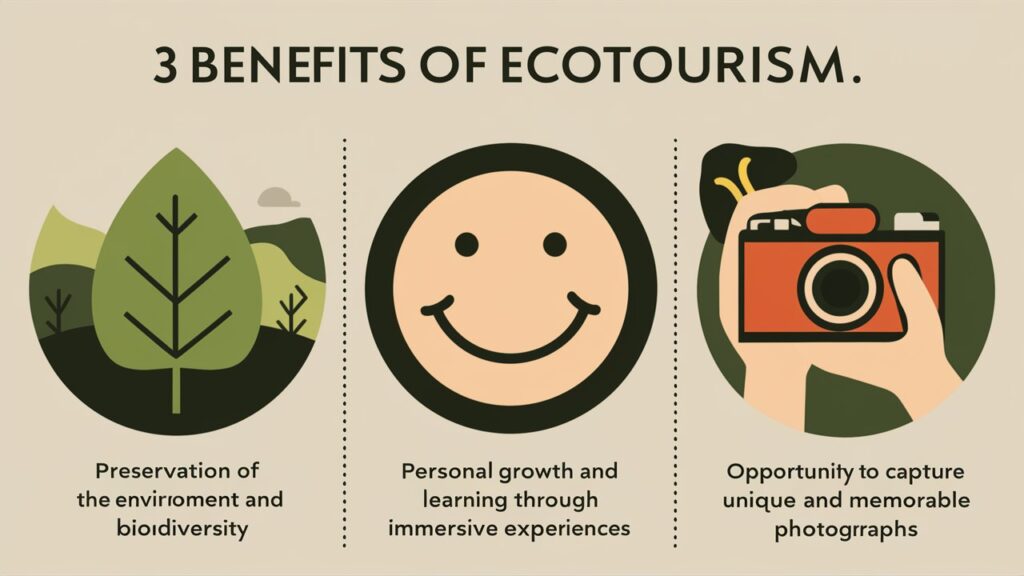Introduction
In a world increasingly aware of environmental issues, ecotourism has emerged as a beacon of sustainable travel. Ecotourism invites travelers to explore the planet’s most pristine and fragile ecosystems while contributing positively to the environment and local communities. This article delves into the three main benefits of ecotourism you need to know, offering insights into how this conscientious approach to travel can make a meaningful difference.
1. Definition Ecotourism

Definition and Principles of Ecotourism
Ecotourism is a form of responsible travel to natural areas that conserves the environment, sustains the well-being of local people, and involves interpretation and education. It emphasizes minimizing the physical, social, and behavioral impacts on the environment while fostering respect for different cultures and traditions. Principles of ecotourism include reducing waste, conserving water and energy, and supporting local conservation efforts.
The Growing Popularity of Ecotourism
Ecotourism‘s popularity has surged as more travelers seek meaningful experiences that align with their values. Adventure seekers, nature enthusiasts, and conscientious travelers are drawn to ecotourism destinations for the unique opportunity to immerse themselves in the natural world while making a positive impact. The rise of social media and increased awareness of environmental issues have further propelled the growth of this sustainable travel trend.
Ecotourism vs. Traditional Tourism: Key Differences
Unlike traditional tourism, which often focuses on commercialized, high-impact activities, ecotourism emphasizes low-impact, mindful engagement with nature. Traditional tourism can lead to environmental degradation, cultural erosion, and economic inequality. In contrast, ecotourism seeks to preserve ecosystems, empower local communities, and promote sustainable development. The key differences lie in the intent, impact, and overall approach to travel.
2. Environmental Benefits of Ecotourism

Preserving Natural Habitats and Wildlife
Ecotourism plays a crucial role in the preservation of natural habitats and wildlife. By generating funds through sustainable tourism practices, ecotourism supports conservation projects that protect endangered species and fragile ecosystems. It discourages harmful practices like deforestation and poaching, ensuring that wildlife can thrive in their natural habitats.
Reducing Carbon Footprint and Pollution
Traveling responsibly means being conscious of one’s carbon footprint. Ecotourism encourages the use of eco-friendly transportation options, such as biking, hiking, and using public transport. Accommodations that adhere to green practices, like solar energy and waste recycling, help reduce pollution. Travelers are also educated on how to minimize their impact, fostering a culture of environmental stewardship.
Promoting Sustainable Practices and Conservation Efforts
Ecotourism fosters sustainable practices by encouraging travelers and businesses to adopt eco-friendly habits. This includes supporting accommodations and tour operators that prioritize sustainability, participating in conservation activities, and spreading awareness about the importance of protecting natural resources. These efforts collectively contribute to long-term environmental health and biodiversity.
3. Economic Benefits of Ecotourism

Boosting Local Economies and Creating Jobs
One of the significant advantages of ecotourism is its ability to stimulate local economies. By attracting visitors to remote and rural areas, ecotourism generates revenue that supports local businesses, creates jobs, and provides a steady income for communities. This economic boost helps improve living standards and reduces poverty in these regions.
Encouraging Sustainable Business Practices
Ecotourism promotes sustainable business practices by encouraging local enterprises to adopt environmentally friendly methods. This includes sourcing materials locally, reducing waste, and implementing energy-efficient processes. By supporting these businesses, travelers help create a market for sustainable products and services, fostering a cycle of positive economic and environmental impact.
Financial Support for Conservation Projects
A portion of the revenue generated from ecotourism often goes directly into funding conservation projects. This financial support is vital for maintaining protected areas, conducting wildlife research, and implementing preservation initiatives. Travelers contribute to these efforts by paying entrance fees, participating in eco-friendly tours, and donating to conservation funds.
4. Cultural Benefits of Ecotourism

Promoting Cultural Heritage and Traditions
Ecotourism provides an opportunity for travelers to engage with and learn from local cultures. By participating in traditional activities, visiting cultural sites, and interacting with local communities, tourists gain a deeper appreciation for diverse ways of life. This cultural exchange helps preserve and promote cultural heritage and traditions, ensuring they are passed down to future generations.
Encouraging Community Involvement and Empowerment
Community involvement is a cornerstone of ecotourism. Local residents are often actively engaged in tourism activities, from guiding tours to managing accommodations. This involvement empowers communities by giving them control over tourism development and ensuring that the benefits are distributed equitably. Empowered communities are more likely to protect their natural and cultural resources.
Fostering Cross-Cultural Understanding and Respect
Ecotourism fosters cross-cultural understanding and respect by facilitating meaningful interactions between travelers and local communities. Through these exchanges, travelers gain insight into different cultures, lifestyles, and worldviews. This mutual understanding helps break down stereotypes, build respect, and promote global harmony.
5. Tips for Responsible Ecotourism
Choosing Eco-Friendly Destinations and Accommodations
When planning an ecotourism trip, choose destinations and accommodations that prioritize sustainability. Look for certifications like the Global Sustainable Tourism Council (GSTC) or Green Globe. These certifications indicate that the destination or accommodation adheres to strict environmental and social standards.
Supporting Local Communities and Businesses
Support local communities by purchasing goods and services from local businesses. This includes staying in locally owned accommodations, eating at local restaurants, and buying souvenirs made by local artisans. By doing so, you contribute to the local economy and help sustain livelihoods.
Minimizing Environmental Impact During Travel
Travel responsibly by minimizing your environmental impact. Use reusable water bottles and bags, avoid single-use plastics, and dispose of waste properly. Respect wildlife by observing from a distance and not disturbing their natural behaviors. Leave no trace by sticking to designated trails and campsites.
Conclusion
Recap of the 3 Main Benefits of Ecotourism
Ecotourism offers significant environmental, economic, and cultural benefits. It helps preserve natural habitats and wildlife reduces carbon footprints, and promotes sustainable practices. Economically, it boosts local economies, encourages sustainable business practices, and provides financial support for conservation projects. Culturally, it promotes heritage, empowers communities, and fosters cross-cultural understanding.
Embrace Ecotourism for a Better Future
Embrace ecotourism to make your travel experiences more meaningful and impactful. By choosing sustainable travel options, you contribute to the preservation of the planet and the well-being of its inhabitants. Make a conscious effort to travel responsibly and inspire others to do the same.
Further Reading and Resources for Aspiring Ecotourists
For those interested in learning more about ecotourism, explore resources like the International Ecotourism Society, Sustainable Travel International, and various ecotourism-focused blogs and books. These resources provide valuable information and tips to help you become a more responsible and informed traveler.
1. What are the benefits of ecotourism?
Ecotourism offers several key benefits:
Environmental Conservation: It promotes the protection of natural areas by raising awareness and generating funds for conservation efforts.
Local Economy Support: By involving local communities, ecotourism provides jobs and encourages sustainable economic development.
Cultural Exchange: It allows tourists to experience local cultures while fostering respect for traditional practices and ways of life.
Minimized Environmental Impact: Ecotourism activities focus on sustainable practices, like reducing waste, conserving water, and minimizing carbon footprints.
Education and Awareness: Ecotourism teaches travelers about biodiversity, conservation, and the importance of protecting the environment.
2. What are the benefits of ecotourism (Quizlet)?
The benefits of ecotourism, as often listed on Quizlet, generally include:
Environmental Preservation: Funds from ecotourism help protect natural habitats and wildlife.
Economic Growth for Locals: By creating jobs in hospitality, guiding, and conservation, ecotourism supports the local economy.
Sustainable Tourism Practices: It encourages responsible travel that reduces harm to the environment.
Cultural Preservation: Ecotourism helps maintain traditional cultures by promoting their significance and providing an incentive to preserve them.
Educational Impact: Travelers gain insight into environmental issues and conservation efforts, raising global awareness.
3. How can tourism benefit the environment?
Tourism can benefit the environment through:
Conservation Funding: Revenue from tourism can be directed toward the maintenance of parks, wildlife reserves, and other natural areas.
Raising Awareness: Tourists often become advocates for environmental protection after learning about ecosystems and conservation.
Habitat Restoration: In some cases, tourism projects actively restore damaged environments by planting trees, cleaning beaches, and protecting endangered species.
Eco-Friendly Infrastructure: Sustainable tourism pushes for the development of green infrastructure, such as eco-lodges and renewable energy facilities.
Controlled Tourism Practices: Tourism, when managed responsibly, limits environmental degradation by establishing rules around waste, resource usage, and visitor impact.
4. What are the benefits of the environment?
A healthy environment provides several crucial benefits:
Ecosystem Services: These include air and water purification, pollination of crops, and climate regulation, which are essential for human survival.
Biodiversity: A rich variety of plants and animals supports ecosystem balance, resilience, and productivity.
Economic Benefits: Natural resources like timber, fish, and clean water are critical for industries such as agriculture, fisheries, and tourism.
Health and Well-being: Access to nature improves mental and physical health by offering recreational opportunities and reducing stress.
Climate Stability: Forests, oceans, and other ecosystems play a key role in absorbing carbon dioxide and regulating global temperatures.



